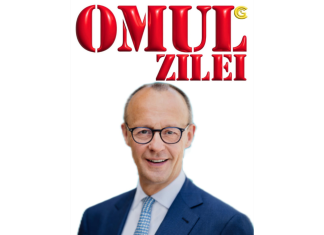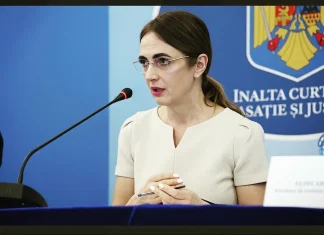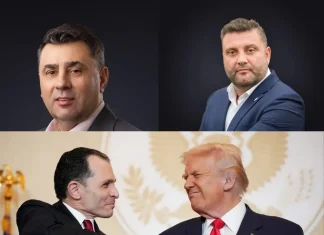Author: Cozmin Gușă
Yesterday morning, HotNews published an analysis, later picked up by multiple media outlets, claiming that TikTok is being invaded by accounts promoting Russian-style manipulations. The USR party (Save Romania Union) quickly asked the SRI (Romanian Intelligence Service) to issue a public clarification — and, surprisingly, the SRI actually responded the same day, assuring us they are on alert.
It’s an organized operation from start to finish; I don’t dispute it, it doesn’t bother me, but it did amuse me. It’s possible that things are as HotNews claims; personally, I haven’t noticed this phenomenon — and even my colleagues Alexa, Turcescu, Spânu, and Ghilezan, who spend a lot of time daily on TikTok and are quite savvy, haven’t noticed it either.
Regardless, the idea that Russian agents might be active on TikTok in Romania isn’t news. Bucharest is crawling with undercover agents from all kinds of countries, not just Russia, agents looking to exploit the fact that Romania has clearly become a watchdog-less village. (Speaking of which, real news would have been the return to Romania of Florin Rotaru, former director of the Bucharest Metropolitan Library, who was decorated by Putin 12 years ago with the Pushkin Medal and then left the country after being suspected of espionage. His return might be a result of the new Trump-Putin agreements. I’ll come back to this.)
From the HotNews–USR–SRI operation, I gathered that the Romanian state is concerned about protecting us from the Russians. They present dangers and demonize the Russian factor with the intention of blocking the possibility of Romanians becoming Russophiles. I can even accept that — after all, the state must keep watch, right?
But I’m informing the state authorities that it’s already too late and there’s nothing they can do, because it no longer depends on them. My generation, and especially the older ones, grew up and were educated in an anti-Soviet spirit, ingrained in our veins — naturally, following the abuses Romania suffered from the USSR after World War II. Furthermore, through Ceaușescu’s strategy of independence from Moscow, that anti-Soviet spirit was further reinforced. After 1989, it evolved into an anti-Russian sentiment.
However, since Romanians have not been directly aggressed by Russia in the past 35 years, this sentiment has gradually faded. In recent years, it was kept artificially alive mainly through Soros-backed manipulations. Moreover, Russia’s global marketing strategy over the last decades, centered around the figure of Tsar Putin, has gained them respect — even sympathy — across many parts of the world.
A funny but telling story about this: Seven years ago, I worked for a few months in Mexico as a political consultant during their electoral campaign. At the time, the FIFA World Cup in Russia was being heavily promoted, and Mexico was participating. Mexicans, as a people, are mostly anti-American. I won’t explain why — it’s well known. Everywhere I went — not just in political circles, but also in hotels and restaurants — I met Mexicans who cursed Trump and the U.S. fiercely but, ironically, praised Putin and Russia, a country tens of thousands of kilometers away and whose president had never even visited Mexico. The idea worked because Putin was seen as someone who could save them from American abuses. The funny part? Pedro, a cheerful waiter at a restaurant where I often ate dinner, would go on and on praising Putin. One evening, I did an experiment: I showed him a picture of Bush Jr. standing next to Putin. Guess what? He easily recognized Bush but had no idea who the other man was!
The moral is simple: Putin had become a likeable name simply because it was said that Americans were afraid of him — he had entered Mexican popular folklore.
Returning to Romania and Romanians: I’ve written many times that, mainly because of the arrogant, mercantile, and cynical way Americans have treated us, pro-Americanism here has long since faded. In fact, I’m convinced that with the Ukrainian war, we can now confidently speak of anti-Americanism among a significant part of the Romanian population. Trumpism, which emerged in the past two years among the sovereignist segment of the Romanian population, helped somewhat to soften this anti-Americanism. There was hope that, once Trump returned to power, he would help Romanians “take back their country.”
Now it’s very clear this won’t happen. I’ve noticed that many people are even embarrassed now that they ever believed it. In recent days, we see how the U.S., through Trump’s decisions, is hitting Europe hard — and Romania too; not only are they failing to bring peace to Ukraine, but they are triggering a global economic crisis that will surely spark a massive anti-American wave. Against this background, the European Union, led by Ursula (von der Leyen) hand-in-hand with the British, wants to send us to war in Ukraine, making them even more disliked than before, further increasing antipathy towards Brussels.
In this social context — where Romanians no longer view the Collective West with sympathy — who do you think has now begun to publicly address them? Putin’s key people: Lavrov, Peskov, Medvedev, and Naryshkin, who talk about exactly what most Romanians want to hear — namely, that our chance to have free elections has been stolen. From time to time, with cunning skill, the Russians even mention Călin Georgescu, although they neither supported him nor intend to.
So, what do we have here? We have an operation whose result — implemented gradually — will be a Russophilization that won’t even need TikTok to succeed. Russophilization will indeed work for a while — you can be sure of it. And I repeat: it will be solidly supported mainly by the grand project of spiritual unification of Orthodox Christians — the so-called “Orthodox International” — a project that will be implemented in countries abandoned by the Americans: Romania, Bulgaria, Moldova, Greece, Cyprus, and also Serbia. And just like that, a new cordon sanitaire will emerge, securing Russian control over the Black Sea — a project Putin explicitly demands and for which we have clear signs that Trump has already agreed.











